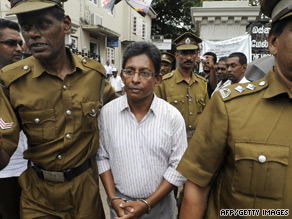
A Sri Lankan court sentenced a journalist Monday to serve 20 years in prison for articles that criticized the military, according to the Asian Human Rights Commission.
“The AHRC is not surprised by this judgment because at the very inception of this case, the AHRC pointed out that this is purely a political case,” the commission said in a statement. J.S. Tissainayagam, the editor of a monthly magazine, was arrested in March 2008 for printing articles critical of the Sri Lankan military’s treatment of civilians during the country’s war on the Tamil Tiger rebel group, according to several human rights groups. The Tamil journalist was held without charge for several months, prompting outrage from human rights and press freedom organizations. He was later charged under the country’s controversial Prevention of Terrorism Act. His case has drawn international attention to the plight of press freedom in Sri Lanka, which ended its decades-long war against the Tamil rebels earlier this year.
Don’t Miss
Video shows purported atrocities in Sri Lanka conflict
Floods hit Sri Lanka refugee camps
The country’s military has been accused of numerous atrocities against civilians during the final months of the 26-year conflict. Sri Lanka has denied the accusations, and routinely rejects calls by human rights groups for independent investigations into its campaign against the Tigers. U.S. President Barack Obama mentioned Tissainayagam in his May 1 statement on World Press Freedom Day: “In every corner of the globe, there are journalists in jail or being actively harassed: from Azerbaijan to Zimbabwe, Burma to Uzbekistan, Cuba to Eritrea. Emblematic examples of this distressing reality are figures like J.S. Tissainayagam in Sri Lanka, or Shi Tao and Hu Jia in China.” The Asian Human Rights Commission condemned Monday’s sentence as “the most glaring proof of the absence of freedom of expression in Sri Lanka.” It called on Sri Lanka and the international community “to condemn the judgment and the sentence in Tissainayagam’s case and to call for his unconditional release.”